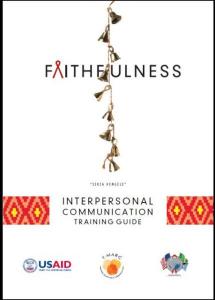HIV Training Guide for Religious Leaders on Interpersonal Communication
The Interpersonal Communication Skills for HIV one-day training curriculum is designed to teach religious leaders how to more easily communicate important information about HIV and AIDS. This training focuses on giving religious leaders tools they will need to effectively listen and communicate HIV information so that it is most likely to be taken to heart by the people they are trying to reach – and therefore more likely to change their behaviors. The training describes four basic interpersonal communication skills needed during HIV prevention conversations: active listening; asking questions and probing; speaking simply; and using support materials to help deliver information. The interactive training methodology encourages participants to discuss and contribute to everyone’s learning experience. It also provides opportunities for participants to practice the four basic skills so that they feel empowered to do them on their own when they return to their communities.
Source: USAID
Date of Publication: March 25, 2019
SIMILIAR RESOURCES
Tools
Examples
- Practical Considerations and Recommendations for Religious Leaders and Faith-based Communities in the Context of COVID-19
- Translators without Borders Glossary for COVID-19
- Love, Children and Family Planning: Seven Discussion Guides for Christian Small Groups
- Community Communication MNCH e-Manual: Participatory Health Promotion Sessions
- Religious Leaders Play Key Role in Battle against COVID-19
- Driving the HIV response: Community Guide to the WHO 2013 Consolidated Guidelines on the Use of Antiretroviral Drugs for Treating and Preventing HIV Infection
- Birth Spacing and Family Welfare Sermons
- Guidance for Including People with Disabilities in Response to the COVID-19 Pandemic
- A Guide to WHO’s Guidance on COVID-19
- Faith-Based Engagement in Family Planning

